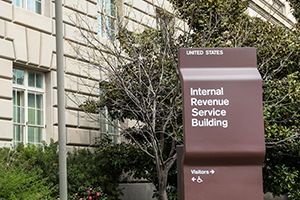 Whether you own cryptocurrency or not, everyone should know the tax rules surrounding this type of property as it becomes more popular. If you have one take away regarding cryptocurrency, it should be this: Remember that Uncle Sam is watching you!
Whether you own cryptocurrency or not, everyone should know the tax rules surrounding this type of property as it becomes more popular. If you have one take away regarding cryptocurrency, it should be this: Remember that Uncle Sam is watching you!
Here’s what you need to know about the IRS and cryptocurrency:
Background
The IRS generally considers cryptocurrency—also referred to as virtual currency or digital currency—to be property, just like stocks and bonds for federal income tax purposes.
Therefore, if you sell cryptocurrency at a gain, it is subject to capital gains tax. Similarly, you may claim a capital loss on the sale or other disposition of cryptocurrency. But that’s not all: Anytime you exchange cryptocurrency for actual currency, goods or services, the IRS says it’s a taxable event.
Say that you hold Bitcoin for longer than one year and then sell it at a gain. The gain is taxable up to 20%. High-income taxpayers may also need to pay a 3.8% surtax on the cryptocurrency gain. Accordingly, you can use a loss from a cryptocurrency sale to offset capital gains plus up to $3,000 of ordinary income. Any excess is carried over to the following tax year.
The IRS Is Watching You!
Cryptocurrency transactions often flew under the radar, but the IRS is now paying much closer attention. Here’s how the IRS is stepping up enforcement efforts:
- Answer a Form 1040 question. The IRS is so concerned about cryptocurrency transactions being reported that they have a cryptocurrency question on Page 1 of your tax return, just below your name. Before filling out any part of your tax return, the IRS wants you to answer a question about whether you received, sold, exchanged, or otherwise disposed of any financial interest in any virtual currency.
- Brokers must report transactions. After 7 years of gently prodding taxpayers to self-report cryptocurrency transactions, Congress has given the green light for the IRS to obtain cost basis and sales proceeds information for all crypto transactions directly from brokers (such as CoinBase, Electrum or Mycelium) or other individuals who regularly provide digital asset transfer services on behalf of other people. Similar to the reporting of stocks and bonds, taxpayers will receive a Form 1099-B from brokers that list all crypto transactions. These new reporting rules are effective beginning January 1, 2023.
- Expanded $10,000 reporting requirement. Businesses that accept virtual currency as payment may be required to report transactions above $10,000 to the IRS beginning January 1, 2023. In an interesting twist, cryptocurrency and other digital assets would be considered cash for purposes of the $10,000 reporting requirement, while the IRS will continue to treat cryptocurrency as real property (and not cash) for tax compliance purposes.
What you need to do
Here are some suggestions for tracking and reporting your cryptocurrency transactions on your tax return:
- Keep up-to-date records. Consider tracking each transaction as they occur throughout the year. You may also want to keep your own transaction ledger as a way to double-check the accuracy of your broker’s statements.
- Set aside money to pay taxes. Consider saving a certain percentage of each cryptocurrency transaction you sell at a gain for taxes you may need to pay.
- Be aware before you dive into cryptocurrency. As you can see, being involved in cryptocurrency may not be for everyone. Wild swings in valuation are common. Reporting requirements are complicated.
Prepare for this year’s tax return filing season
 Tax return filing season usually gets a little crazy, but this year will be more turbulent than most. Due to new tax legislation and guidance from the IRS, you will have to cope with a wide variety of tax changes, some of which relate to the pandemic. Here are several tips for making some order out of the chaos.
Tax return filing season usually gets a little crazy, but this year will be more turbulent than most. Due to new tax legislation and guidance from the IRS, you will have to cope with a wide variety of tax changes, some of which relate to the pandemic. Here are several tips for making some order out of the chaos.
Unemployment benefits
Unemployment benefits are taxable once again in 2021. In 2020, the first $10,200 of benefits received by taxpayers with an adjusted gross income (AGI) of less than $150,000 were exempt from tax. Unfortunately, the tax-free nature of unemployment benefits in 2020 was made long after many of you filed your tax return. If this pertains to you, and you haven’t received a refund from a tax overpayment yet, you might need to file an amended 2020 tax return.
Small business loans
To kick start the economy during the pandemic, Congress created a loan program called the Paycheck Protection Program (PPP). Similarly, your small business might have received an Economic Injury Disaster Loan (EIDL) or grant. These loans may be forgiven in 2021 without any adverse tax consequences if certain conditions were met. So, gather your records—including what you received and when—for optimal tax protection.
Economic impact payments
Congress handed out three rounds of Economic Impact Payments to individuals in 2020 and 2021. The third payment provided a maximum of $1,400 per person, including dependents, subject to a phaseout. For single filers, the phaseout begins at $75,000 of AGI; $150,000 for joint filers. So, review your records and be very clear what payments you received in 2021. Only then can you use your 2021 tax return to ensure you receive credit for your full stimulus payments.
Child tax credit
Many families will benefit from an enhanced Child Tax Credit (CTC) on their 2021 tax return. The new rules provide a credit of up to $3,000 per qualifying child ages 6 through 17 ($3,600 per qualifying child under age six), subject to a phaseout beginning at $75,000 of AGI for single filers and $150,000 for joint filers. What will complicate this year’s tax filing are any advance payments you received from the IRS during the second half of 2021. It is important that you accurately identify all the payments you received. Only then can correct adjustments be made on your tax return to ensure you receive the full Child Tax Credit amount.
Dependent care credit
The available dependent care credit for qualified expenses incurred in 2021 is much higher than 2020, with a corresponding increase in phaseout levels. The maximum credit for households with an AGI up to $125,000 is $4,000 for one under-age-13 child and $8,000 for two or more children. The credit is gradually reduced, then disappears completely if your AGI exceeds $440,000.
Due to the ongoing debate of proposed legislation in Washington, D.C., this year’s tax filing season will seem a bit chaotic. With proper preparation, though, your situation can be orderly…but only if you prepare!
What you need to know if one of your tax returns is stuck
 The IRS is coping with a backlog of historical proportions and it is impacting millions of taxpayers. According to IRS sources, as of July 31, there are still over 13 million tax returns that are to be processed. The nearly unprecedented delay is being attributed to the COVID-19 pandemic, under staffing at the IRS, and a slew of recent tax law changes. The challenge is how to navigate the IRS notices if you are caught up in this mess.
The IRS is coping with a backlog of historical proportions and it is impacting millions of taxpayers. According to IRS sources, as of July 31, there are still over 13 million tax returns that are to be processed. The nearly unprecedented delay is being attributed to the COVID-19 pandemic, under staffing at the IRS, and a slew of recent tax law changes. The challenge is how to navigate the IRS notices if you are caught up in this mess.
Complicating your tax life
- You’ve filed for an extension via mail, but the IRS says you haven’t filed your return yet and issues notices and penalties.
- You keep getting letters from the IRS after responding to initial inquiries.
- You filed your tax return on time, but the IRS says it doesn’t have your return, even though you may have received a confirmation.
What you can do
While you may not be able to get your tax return processed any faster, there are steps you can take to stay informed and make it easier for the IRS to work with your tax situation:
- Track your refund status. The IRS has developed an online tool, “Where’s My Refund?” that can provide updates. Find it at https://www.irs.gov/refunds.
- Check out IRS2Go. The agency also provides a mobile app called IRS2Go that checks your tax refund status. You can see if your return has been received, approved, and sent.
- Stay calm and keep responding. If the IRS sends you notices, keep detailed records of the notices and your timely replies. Eventually, they will get caught up. So keep good records by leaving a digital footprint and back up electronic records with paper versions.
- Prior correspondence is your friend. When you’re replying to IRS notifications, attach copies of prior correspondence with your latest letter. Make it easy for the IRS to follow your paper trail by dating each response and keeping the most recent response on top.
- Keep proof of delivery. Use express delivery or certified mail to confirm that the IRS receives your responses in a timely manner.
Remember that the IRS is working as quickly as it can to clear this backlog.
 With home sales booming throughout much of the country, you may decide that now’s the right time to put your abode on the market. If you do put your primary residence up for sale, try to steer clear of the following mistakes.
With home sales booming throughout much of the country, you may decide that now’s the right time to put your abode on the market. If you do put your primary residence up for sale, try to steer clear of the following mistakes.
- Not qualifying for the home sale exclusion. If you’ve owned and used your home as your principal residence at least two out of the last five years, you can exclude from your taxable income the first $250,000 of gain if you’re single and $500,000 if you’re married.
What you can do: Consider a delay of selling your home until you meet the 2-out-of-5-year threshold. If you can’t qualify for a full exclusion, you may qualify for a partial exclusion if your sale results from an employment change, a need for medical care or other IRS-approved circumstances.
- Forgetting to deduct points. If you have points from your current mortgage that you haven’t deducted on a previous tax return, include the balance of these points on your next tax return. Too many taxpayers forget to do this and lose thousands in deductions.
What you can do: Review your loan documents before selling your property. Identify all costs, including points, that are included in the loan. Save the document with your tax records to ensure the deduction is not forgotten.
- Not double-checking your settlement statement. Closely review the closing statement. It is easy to assume all the numbers are correct and the math is done right. Often this is not the case! And a mistake here could be costly.
What you can do: Review the closing document multiple times. Have your Realtor and closing agent explain items you don’t understand. Pay special attention to property taxes. The property tax bill will be allocated between the seller and the buyer. Only pay the share of the bill that covers the time period when you’re the owner.
Selling a home is full of tax implications. Since selling a home is not an everyday occurrence, it is easy to make a mistake. So, if you need help with these or any other tax questions surrounding the sale of your house, contact your financial advisor…before you sell!
Here are four ways to make sure the preparation of your tax return keeps humming along until it gets filed.
- Keep tax documents in one place. Missing items are one of the biggest reasons filing a tax return gets delayed! Find a place in your home and put all tax documents in this one place as you receive them. Common missing items this year will include the new 1099-NEC for any taxpayers that are contractors, consultants or part of the gig economy.
- Organize documents by type. Every tax professional has a story of someone bringing their documents to them in a shoebox or storage container. All this does is increase the amount of time it takes to prepare your return, so it’s best to sort your documents in tax return order. Pull out last year’s tax return and create folders for each section including income, business/rental information, adjustments to income, itemized deductions, tax credit information and a not-sure bucket.
- Create list of special events. You receive a Form W-2 from your employer every year. You may get a 1099-INT from your bank if you earn interest income on your deposit accounts. But selling a home usually doesn’t happen every year. Retiring from a 40-year job doesn’t happen every year. Sending a child to college also doesn’t happen every year (although it might seem like it does!). If you don’t write down these unusual events as they happen, you might forget them when your tax return is being prepared. And you may not remember until the moment your return is about to be filed. This is sure to cause delays.
- Don’t forget your signature! You may be surprised to learn that even if you electronically file your tax return, you still must sign Form 8879, which authorizes the e-filing of your return. So, whether it’s a traditionally-filed paper tax return or one filed electronically, a signature is required.
 These are four of the more common reasons why the preparation of your tax return may get delayed. Be prepared and file your return without a hitch!
These are four of the more common reasons why the preparation of your tax return may get delayed. Be prepared and file your return without a hitch!